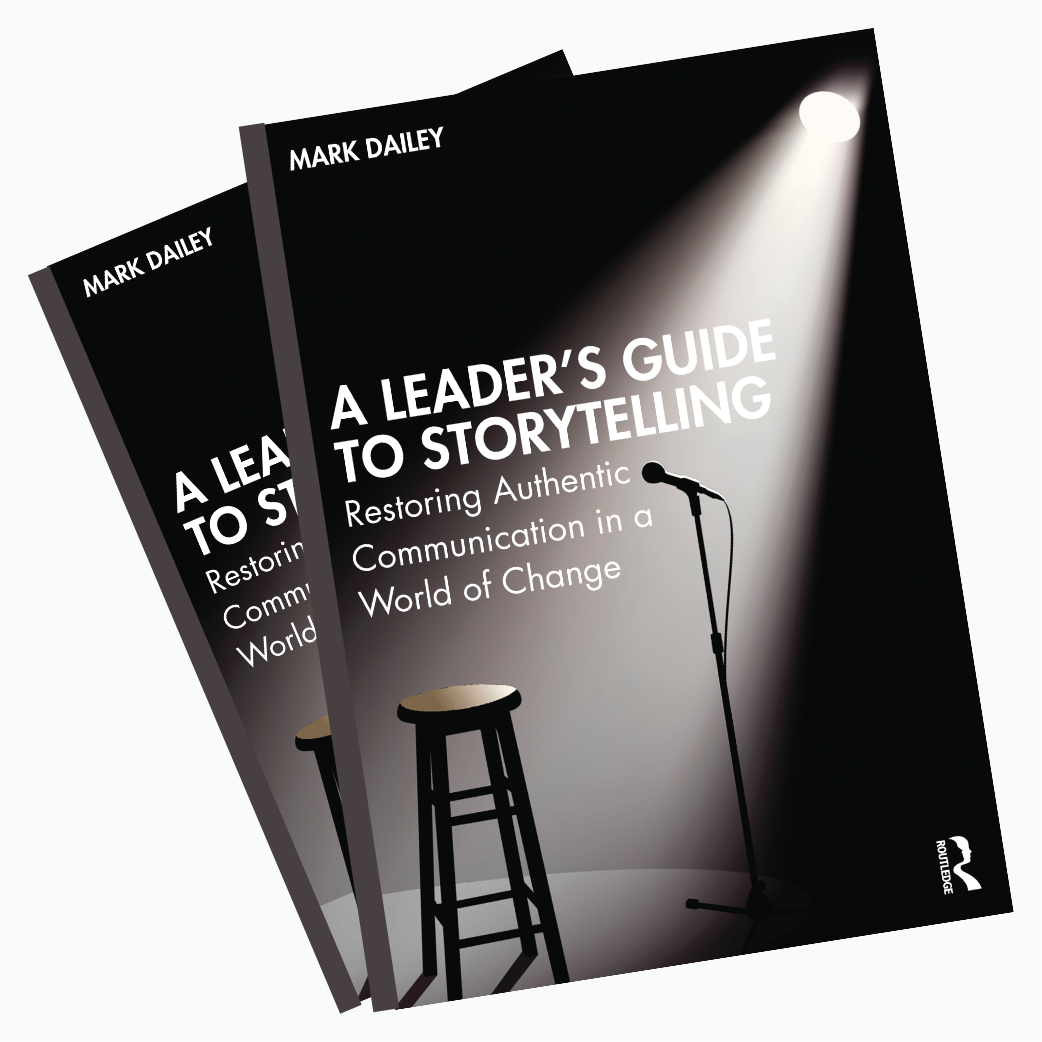A Leader’s Guide to Storytelling – restoring authenticity in a world of change
By Mark Dailey, author and communications specialist

Mark Dailey's book: A Leader's Guide to Storytelling
Women Talk Real Estate was instrumental in helping me finally put pen to paper – or cursor to laptop screen – and write a book about leadership and communications.
Firstly, co-founder Andrea Carpenter had been an inspiration to me by bringing out her own book on the UK property industry a few years ago and she kindly gave me loads of tips and insight into getting the book published.
Andrea also weighed in with sage advice about always needing to remember who the audience is and write with that person in mind – in my case business leaders.
But the entire ethos of Women Talk Real Estate - now rebranding as Diversity Talks Real Estate to reflect a wider, more inclusive audience - encapsulated what I wanted to write about, which was the increasing need for leaders to talk with
authenticity and passion about what they believe and what is important.
Diversity Talks Real Estate is primarily a platform for people to gain in confidence, realise the innate power they have to comment on a still male-dominated industry and to bring their own sense of style and authenticity to that conversation.
This in miniature is what my book is about.
My book begins with a simple observation that people are innately good at communicating when they cast aside expectations and inhibitions and simply talk about themselves – the story of me. But this positioning rarely lasts and instead gets hopelessly swamped in the urge to show credentials and expertise, deliver detail and offer more information in the hope that we can paper over what we fear is the hollowness of our own thoughts.
There is a profound psychological rift that lies at the heart of most people’s communicating. Deep down, at an almost unconscious level, they know fundamentally what they want to say, what they believe, how to say it and what they feel. But this inner knowing, confidence and surety has over the years been so camouflaged and obfuscated by the weight of convention, expectation, fear and lack of nurturing that many of us have lost touch with this fundamental aspect of our humanity.
This, in great part, is what Diversity Talks Real Estate is trying to do with the courses and training it provides. To bolster confidence and to help people trust themselves to tell the story their way.
Storytelling and communicating with emotion and meaning are the key skills that have been lost.
And our awareness that this has happened only glows dimly – a faint impulse within that reminds us that there is a different way – that there was a time when we did this differently, with more authenticity and without calibrating and analysing everything so much.
I believe communicating with skill and passion is needed now more than ever before. Because the sheer complexity of our modern world and the turbocharged pace of technological change is such that being able to show emotion, story-tell, articulate meaning and enable awareness will be critical to ensuring some kind of counterbalancing force is at work as we together move through the coming vortex of change.
Two mega trends will dominate the business world of the next decade: the inexorable acceleration of technological change and the immutable rise of social values like fairness and equality. This will make for a complex communications landscape and that will test the very nature of leadership and communications.
The first trend will be seen in the wave of disruption that will gather pace as automation, artificial intelligence and algorithms begin to profoundly reshape business. The digital divide will describe the gap between those who are able to find employment directing this effort and adding value through advisory, creative and insight services and those who will be increasingly marginalised.
The second trend – the rise of the importance of social values and the demand for action on issues such as fairness, racism, climate change and sustainability – will be accompanied by roiling emotion and rising expectations.
The quantum of expected disruption and change over the next ten years will be of such a magnitude that the core business skill leaders will need will be effective communication. To find a workable balance between the detached, inexorable logic of automated change on the one hand, and the visceral emotion of those yearning for social change but experiencing so much economic and structural disruption on the other hand.
The predominant dynamic leaders contended with from 1945 to about 1995 was growth – how to best grow the business and capture market share. Sine 1995 growth has been eclipsed by change and the need to adapt to ever faster and more disruptive change.
Now, a new paradigm is emerging: the character-driven, values-oriented marketplace.
As the pace of change grows exponentially, it will not be enough to try and understand or adapt to change. Employees, customers and stakeholders will increasingly want to know what leaders feel about the changes they are facing and what is their vision; in other words, where should all this change be leading us to?
The questions will be pointed and personal: what do you value and perceive is worth holding on to? Why are you moving in this direction and what moral position lies behind the products and services you are offering and the public positions you are asking us to take?
The competitive landscape of the next ten years is likely to be dominated by questions that increasingly have a higher moral aspect to them than the more familiar concerns of revenue growth or adapting to change. Increasingly, the ability to analyse and understand change without having a view on what constitutes desirable change and what is morally repugnant will be seen as outsourcing corporate responsibility.
And so, the book is part manual on how to communicate; part call to arms to not shy away but take up the challenge of communicating from the heart in times of great change; and part memoir – a manuscript crammed with examples and stories from a life spent in communications.
Diversity Talks Real Estate is a perfect example of this new mode of communicating: collaborative and courageous with the ethos that individuals can make a huge difference by recognising what genuine communication looks and feels like and how to do it.
As Women Talk Real Estate broadens its remit and rebrands as Diversity Talks Real Estate - this stance of encouraging and enabling others to tell their story with emotion and meaning resonates with everything that is in my book.

Mark Dailey
As a Director at Madano, a communications consultancy, Mark advises firms on strategy, corporate positioning and internal communications. He also leads Madano’s coaching and training business, designing programmes to help companies manage complex change, improve engagement and productivity, and strengthen communications.
Clients come from financial and professional services, pharmaceuticals, property and construction, and energy and the environment.
Before joining Madano in 2011, Mark was a Head of Communications for four banks, worked for the Hong Kong Trade Development Council during the handover and was a journalist and newsreader for 12 years.
Mark has an MBA from Henley Management College and is a Governor of a north London school.
Email Address: mark.dailey@madano.com
Phone Number: +44 (0)20 7593 4012